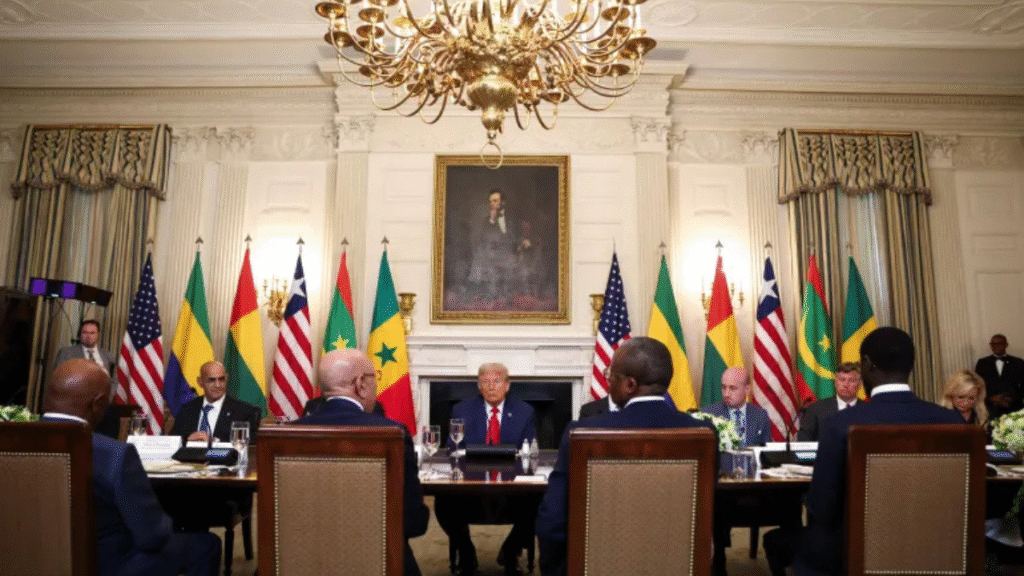Trump Invites West African Leaders to Increase Trade:
Former U.S. On Wednesday, former President Donald Trump hosted the heads of state from five West African countries at the White House,(Increase Trade) aiming to deepen economic partnerships and boost trade relations with the African continent. During a working lunch with Trump, the leaders of Gabon, Guinea-Bissau, Liberia, Mauritania, and Senegal discussed trade, development, and investment potential.
The summit takes place as the United States looks to expand its influence throughout Africa, a continent abundant in strategic potential and natural resources. These five countries only account for a minor portion of trade between the United States and Africa, but Washington is becoming more aware of their undeveloped mineral, oil, and tourism potential.
African Leaders Declare, “We Are Rich in Resources, Not Poor.”
In terms of optimizing the value of its resources, Gabon’s president, Brice Oligui Nguema, stressed that his nation—and the continent as a whole—is not impoverished, but rather underdeveloped.
“Our nations are not impoverished. In terms of raw minerals, we are wealthy,” Nguema remarked. “We require partners to assist us in creating those resources through mutually beneficial partnerships.”Increase Trade)
Funding for the Banio Potash Mine in Mayumba, Gabon, was announced by the U.S. International Development Finance Corporation (DFC) in support of this objective. This investment will boost domestic economic growth and lessen Gabon’s dependency on imports.(Increase Trade)
“DFC’s initiatives help local communities and give American companies access to new markets,” stated Conor Coleman, DFC’s head of investments. “These collaborations foster a more robust and secure global economy.”
Trump is invited by Senegal to play golf in West Africa.
Bassirou Diomaye Faye, the president of Senegal, emphasized the potential for tourism in his country by pointing out its closeness to the US.
Faye brought up the idea of developing a golf course, suggesting it could attract Trump’s attention, and emphasized that the location is merely six hours away from New York by air.. He invited Trump warmly, saying they’d be thrilled to host him and watch him display his skills.
The humorous remark made everyone in the room laugh, but it also demonstrated how hard African countries are working to get American investment outside of aid.
Trump Applauds the Liberian President’s English, But Learns a History Lesson
Trump’s remark on Liberian President Joseph Boakai’s fluency in English, despite the fact that English is Liberia’s official language, was a lighthearted moment during the lunch.
more about:
“Excellent English,” Trump remarked. “Where did you acquire your exquisite speech?”
“In Liberia, sir,” replied Boakai with a smile.
English is still the official language of Liberia, which was established in the 19th century by emancipated African American slaves. Trump said, “That’s very interesting,” after his remark caused the table to erupt in laughter. Some of the people seated at this table are not nearly as proficient speakers.
In a polite reply, Boakai expressed support for the former president’s ideas and thanked Trump for the encounter.
The United States and Liberia have been friends for a long time.We align with your mission to help America reach its greatest heights once again,” Boakai declared…
Drug trafficking and migration are also on the agenda.
The meeting’s topics included regional security as well as trade and investment. Guinea-Bissau has historically struggled with drug trafficking issues, while Senegal and Mauritania are important migratory routes to Europe and the United States. As the United States works to lower transnational crime and illegal migration, these are its main concerns.
The United States Transitions to Strategic Partnerships from Foreign Aid
U.S. officials announced a significant change in foreign policy earlier this month, along with the official dissolution of the U.S. Agency for International Development (USAID). The new strategy abandons “charity-based foreign aid” in favor of forming alliances with nations that show they have the capacity and desire to advance on their own.
Critics warn of humanitarian repercussions, while the White House claims this encourages independence. According to a recent study that was published in the medical journal The Lancet, reducing aid could result in over 14 million avoidable deaths by 2030.
The African Union Responds to American Visa and Tariff Policies
Although the White House meeting projected a positive tone, officials from the African Union remained doubtful about its long-term impact. Under what they describe as “abusive” tariffs and tight visa regulations that unfairly target African countries, they wonder how meaningful trade can thrive.
Troy Fitrell, the U.S. The U.S. ambassador to Africa dismissed the accusations of bias, emphasizing America’s continued commitment to equitable engagement.commitment to equitable commerce and security cooperation throughout the continent.
Although the White House meeting marks a change in tone and approach, it may not resolve every problem affecting U.S.-African relations. The goal for African countries is to transform their natural resources into economic success. The goal for the United States is to establish safe, profitable trade partnerships in a cutthroat international marketplace.
One thing is certain, though: Africa is no longer satisfied with one-sided aid. It remains to be seen if these discussions result in actual action. It seeks recognition, investment, and a place at the world economic table.
